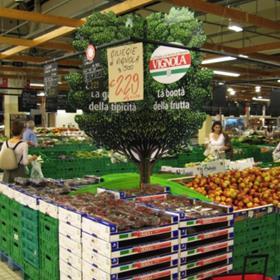
The Italian grocery sector has this year witnessed a drop in volume sales across the country as consumers cut their spending in the wake of the financial crisis. Italian retail consortium CIA-Conad said that it had observed a change in grocery shopping habits – including a decrease in spending – across Italy, although its own results suggested the company was managing to overcome such economic problems.
'The economic crisis and the consequent fall in consumption are leading to a change in people’s shopping habits,' the company said in a statement. 'For the first time, there has been a downturn in the amount spent on food, while Conad-branded products, which guarantee lower prices and good quality, have seen their share of total sales exceed 30 per cent.'
The company announced a 3.5 per cent increase in sales to €1.7bn last year, with wholesale turnover coming in at €720m, and has predicted further growth in 2010, forecasting a 2.5 per cent increase in sales across the network and a 3.5 per cent upturn in the cooperative’s turnover.
According to Giorgio Ragusa, director general of Conad’s Sicilian branch, such results owe much to the company’s decision to outsource its packhouse and develop a new platform to improve the handling of fresh produce from its various suppliers in the region. He said that the need to ensure competitive prices, a short supply chain and guaranteed quality were fundamental elements of a successful strategy within the fresh produce sector, especially during a recession, making consolidation and efficiencies along the supply chain more necessary than ever.
'Today, the platform is certainly a point of reference for the distribution of fresh fruit and vegetables – one that is able to guarantee quality, safety, traceability and innovation thanks to the support of strong and dependable suppliers,' he said. 'But above all, the facility is able to offer our members an efficient and competitive service, helping them to improve their margins.'
“Only an organised platform, which cuts out intermediary steps and is operated by a strong and forward-thinking partner, is able to supply retailers with the ideal tools to implement a winning commercial strategy,' commented Salvatore Andolina, president of Cediof, the company charged with managing the new fresh produce distribution platform.
Claudio Gamberini, head fresh produce buyer at Conad, said that the consortium’s fresh produce department played a strategic role in differentiating its stores from those of its competitors, not least in terms of the quality of the produce on offer.
'Conad believes in the strength of the fruit and vegetable sector and is focused on the quality of its offer and on innovation in its own private label products, which carry the Conad Percorso Qualità and Sapori & Distinti brands,' he said. 'These stand out because of the continued checks that are implemented along all of our supply chains and which go beyond the legal requirements, as well as the various controls we have in terms of companies’ ethical behaviour relating to labour and the environment.'
This summer, Conad opened its first stores under the Sapori & Dintorni name, a special banner offering high-quality, premium ranges of local produce and, in particular, products typical to the region in which the outlets are located. Fresh produce features prominently in the stores, both of which are located in the centre of Florence and feature a dedicated area for product tastings. A number of EU-certified fruits and vegetables are on show, including Sicilian red oranges, Val Venosta apples, Val di Non Renetta apples, Emilia-Romagna pears, Pachino tomatoes, Altedo green asparagus, Etna prickly pears and Puglia grapes.
Another retailer, and market leader, Coop Italia, has taken the local produce concept a step further, putting the image of the producers that have grown the produce on-pack. Starting with courgettes but due to be extended to other products, the Filiera Cooperativa (Cooperative Supply Chain) initiative was trialled earlier in the year in the region of Emilia-Romagna, with a view to a national rollout should it prove successful.
The scheme is the result of a partnership between rural development association Legacoop Agroalimentare, Coop Italia’s central Adriatic division and fresh produce supplier Agribologna.
Under the tagline ‘Fruit and vegetable producers show their face’, photos of a total of 11 growers – nine from Emilia and two from Romagna – have been printed on the packs, accompanied by the name and location of the suppliers’ companies. On the reverse of the packs, consumers are able to find information about the products’ nutritional content, as well as recipe suggestions. The items are reportedly being sold at the same price as the equivalent loose product.
Coop vice-president Massimo Bongiovanni explained that the project was aimed at highlighting the intrinsic values of horticultural production, such as traceability, short supply chains, territorial links, quality and food safety.



